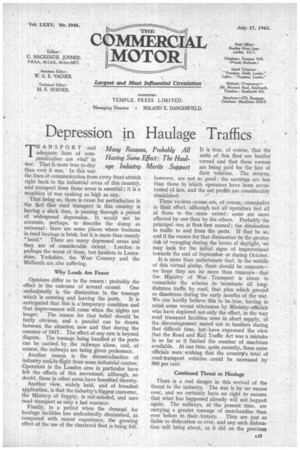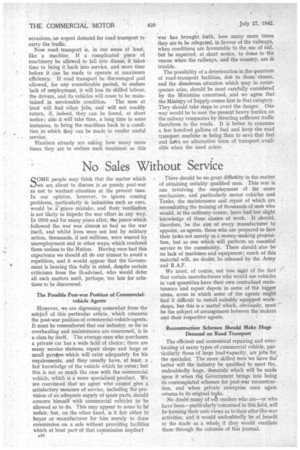Depression in Haulage Traffics
Page 17

Page 18

If you've noticed an error in this article please click here to report it so we can fix it.
TRANSPORT and adequate lines of corn.munication are vital* in war. That is more true to-day than ever, it was. In this war the lines of communication from every front stretch right back to the industrial areas of this country, and transport frcim those areas is essential ; it is a munition of war ranking as high as any.
• That being so, there is cause for perturbation in the fact that road transport in this country is having a slack time, is passing through a period of widespread depression. It would not be accurate, perhaps, to describe the slump as universal : there are some places where business in road haulage is brisk, but it is more than merely "local." There are many depressed areas and they are of considerable extent. London is perhaps the worst of them, but hauliers in Lancashire, Yorkshire, the West Country and the Midlands are also suffering.
Why Loads Are Fewer Opinions differ as to the reason : probably the effect is the outcome of several causes. One undoubtedly is the diminution in the tonnage which is entering and leaving the ports. It is anticipated that this is a temporary condition and that improvement will come when the nights are longer. The reason for that belief should be fairly obvious, and a parallel can be drawn between the situation now and that during the summer of 1917. The effect at any rate is beyond dispute. The tonnage being handled at the ports can be carried, by the railways alone, and, of course, the railways are being given preference.
Another reason is the decentralization of industry andas flight from some industrial centres. Operators in the London area in particular have felt the effects of this movement, although, no doubt, those in other areas have benefited thereby. Another view, widely held, and of broadest application, is that the industry's biggest customer, the Ministry of Supply, is rail-minded, and uses road transport as only a last resource.
Finally, in a period when the demand for haulage facilities has undoubtedly diminished, as compared with recent experience, the growing effect of the use of the chartered fleet is being felf. It is true, of course, that the units of this fleet are haulier owned and that these owners are being paid for the hire of their vehicles. The returns, however, are not so good : the earnings are less than those to 'which operators have been accustomed Of late, and the net profits are considerably diminished.
These various causes are, of course, cumulative in their. effect, although not all operators feel all of them to the, same extent : some are• more affected by one than by the others. Probably the principal one is Ilia* first named ; the diminution in traffic to and from the ports. If that be so, and if the reason for that diminution be the greater risk of voyaging during the hours of daylight, we may look for the initial signs of improvernent towards the end of September or during October.
It is more than unfortunate that, in the middle of this virtual slump, there should be rumours-we hope they are no more than rumours—that the Ministry of War Transport is about to resuscitate the scheme to terminate all longdistance traffic by road, that plan which proved so disastrous during the early months of the war. We can hardly believe this to be-true, having in mind some recent utterances by Ministry officials who have deplored not only the effect, in the way road transpart facilities were in short supply, of the discouragement meted out to hauliers during that difficult time, but have expressed the view that the Road and Rail Traffic Act was a mistake in so far as it limited the number of Machines available. At one time, quite recently, these same officials were wishing that the country's total of road-transport vehicles could be increased by 300 per cent.
Continued Threat to Haulage There is a real danger in this revival of the threat to the industry. " The war is by no means over, and we certainly have no right to assume that what has happened already will not happen again. The railways, at the present time, are carrying a greater tonnage of merchandise 'than ever before in their (history. They are just as liable to dislocation as ever, and any such dislocation will bring about, as it did on the previous occasions; an urgent demand for road transport to carry the traffic.
Now road transport is, in one sense at least, like a machine. If a complicated piece of machinery be allowed to fall into disuse, it takes time to bring it back into service, and more time before it can be made to operate at maximum efficiency. If road transport be 'discouraged and allowed, for any considerable period, to endure lack of employment, it will lose its skilled labour, the drivers, and its vehicles will cease to be main tained in serviceable ,condition. The men at least will find other jobs, and will not readily return, if, indeed, they can be found, at short notice ; also it will take time, a long time in some instances, to bring the, machines back to a, condition in which they can be made to render useful service.
'Hauliers already are asking how many more times they are to endure such treatment as this war has brought forth, how many more times they are to be relegated, in favour of the railways, when conditions are favourable to the /use of rail, but be expected, at short notice, to dome to the rescue when the railways, and the country, are in trouble.
The possibility of a deterioration in the quantum of road-transport facilities, due to these causes, and the disastrous situation which may in consequence arise, should be most carefully considered by the Ministries concerned, and we agree that the Ministry of Supply comes first in that category. They should take steps to avert the danger. One way would be to ease the-present heavy burden on the railway companies by directing sufficient traffic therefrom to the roads. It is better to consume a few hundred gallons of fuel and keep the road transport machine in being than to save that fuel and hive no alternative form of transport available when the need arises.




















































